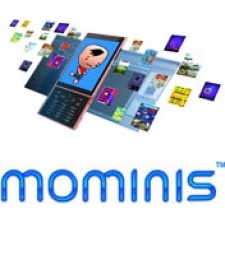There are plenty of companies who are trying to solve the dilemma of getting games developed across as many devices as possible.
There are an equal number of companies who are looking at ways of publishing games across the myriad of app stores and operator decks now available.
Israeli start up MoMinis is attempting to target both issues, with the launch of its platform agnostic game development and distribution platform
"The problem of device fragmentation is getting harder, while distribution is becoming more difficult with different business models and approval processes," explains Eyal Rabinovich, veep of community and content.
"We're dealing with this by offering a new way of developing and distributing games."
Integrated approach
Dealing with the entire mobile ecosystem in this way means MoMinis has to appeal to all parts of the industry.
Developers are serviced with the free MoMinis Studios tool, while the company deals with aggregators and operators to get content onto their decks and app stores. There's also a consumer-facing part of the business with the option to offer personalisation features within games.
Formed in 2008, and backed by Mitsui Ventures and BRM Capital, MoMinis has already demonstrated its system works. It has live content on Vodafone, Telefonica, and Verizon, while its Japanese links have resulted in 100 localised games available on its own deck via DoCoMo.
Now the push is to get more developers signed up to the platform, building the current catalog of 150 games into something more substantial.
Build once
According to Rabinovich, one of the big advantages for developers is the open nature of MoMinis.
There's a typical 70:30 revenue split in place, which can rise up to 90:10 in certain circumstance, but as well as publishing through MoMinis, developers can release their games under their own name. But, clearly, the point of signing up is to use the full service offered from development tools right through to distribution.
There are some restrictions however in terms of how MoMinis Studio works.
It uses a drag-and-drop approach to game creation via an event driven mechanism, and at the moment only supports 2D and 2.5D games. In this way, it's perhaps best suited to creators coming from web and Flash games. There no technical reason why it can't handle more complex content though.
"We'll look to support 3D once more devices support it in a couple of years," Rabinovich says. "At the moment, the most popular mobile games are casual 2D games, so I don't think this is a big issue."
Similarly, the maximum resolution of 480 x 800 pixels will be increased so the system can support tablets.
Deploy everywhere
Of course, the flipside is the way in which MoMinis Studios automatically allows developers to support multiple platforms - Android, Blackberry, Symbian, and J2ME, with iOS to come - and in terms of the various screen sizes and input types required.
This happens as games are developed in a dynamic environment using various templates and sent to MoMinis' server to be compiled, although an inbuilt simulator and various performance and analytic tools let you see how the game will run. There's a feature where you can play directly on your device too.
Still, the good news is this single submission process handles all supported platforms and the various distribution channels. And because compilation occurs on a central server, retrospective support for new platforms can be easily dropped into place.
For cash
Technology aside, the main strength of MoMinis are the business opportunities it enables.
Developers decide the price of their games using a simple 1, 3 or 5 unit range, which is then converted for local pricing, while MoMinis handles billing in terms of straight downloads or bundling and subscriptions. In-app purchases will be supported soon. MoMinis can also handle localisation thanks to existing partnership in local regions
Obviously, J2ME remains the most popular platform for carriers, but Android growing fast and according to Rabinovich is "strategically important" to the company's future.
And, to get an idea of what you can do with the technology, here's one of the games MoMinis provides the assets and source for.
You can find out more details via MoMinis' developers page.
MoMinis looks to solve mobile game fragmentation and distribution issues with integrated ecosystem
Play nice everywhere



















